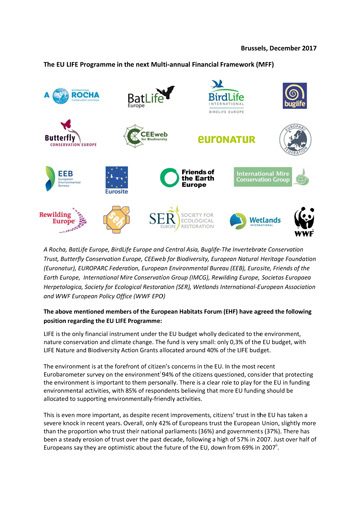The European Union’s multi-annual financial framework is currently being reviewed for the post-2020 period. Rewilding Europe, together with a number of other leading European conservation NGOs in the European Habitats Forum, is calling for the budget of the LIFE programme to be significantly increased, along with a range of other amendments.
With the European Union (EU) now reviewing its multi-annual financial framework for the period after 2020, Rewilding Europe and a group of other leading European NGOs working together in the European Habitats Forum, are calling for the ongoing LIFE programme to have its funding increased to at least 1% of the total annual EU budget. A position paper, co-signed by Rewilding Europe, was presented to the European Commission to this effect in December 2017.
The LIFE programme is the EU’s only financial instrument wholly dedicated to the environment, nature conservation and climate change. Since it began in 1992, it has received just 0.3% of the total annual EU budget, with LIFE Nature and Biodiversity Action Grants accounting for around 40% of the LIFE budget.

Over the last 25 years the LIFE programme has seen more than 4,500 projects co-financed across Europe. These have greatly supported the protection of Europe’s species and habitats, with a mid-term evaluation of the programme by the EU last year concluding it has consistently delivered on its set targets. Moreover, the benefits of the programme to European society have far outweighed the costs.
European Protected Areas have widely trusted in the LIFE programme to implement their conservation activities, and it has proven successful in restoring habitats and boosting the populations of endangered species across the continent. Promoting trans-boundary conservation and local level partnerships that would otherwise be unlikely to occur, it will contribute to implementation of the recently published EU Action Plan for nature, people and the economy.
The LIFE programme is a particularly relevant fund for Central and Eastern European countries, where the general economic situation can be challenging. The position paper also calls for the general co-financing rate on LIFE projects to be increased to at least 75% to overcome the financial constraints of many applicants.
Much of Europe’s nature is still in decline and the EU risks missing its 2020 target of halting biodversity loss. Despite the great success of LIFE projects past and present, current EU funding levels fall a long way short of delivering effective nature conservation – conservation that today is increasingly important to European citizens. Bearing in mind the LIFE programme’s high rate of return and potential for job creation through green investment, the argument for increased programme funding has never been more compelling.
Rewilding Europe itself is currently involved in two LIFE projects – the LIFE Bison project in the Southern Carpathian mountains of Romania, and the LIFE Vultures project in the Rhodope Mountains of Bulgaria. Both of these projects are now bearing fruit in terms of restoring populations, raising awareness of conservation issues and driving nature-based economic growth.
“We have seen first hand the fantastic progress that can be made with LIFE projects,” says Frans Schepers, Rewilding Europe’s managing director. “The LIFE programme not only helps Europe’s wild nature, but it also brings great benefits to European society. Now is the time for the EU to recognise this and substantially increase funding for this critical financing mechanism in European conservation.”
View the full LIFE programme position paper here.
